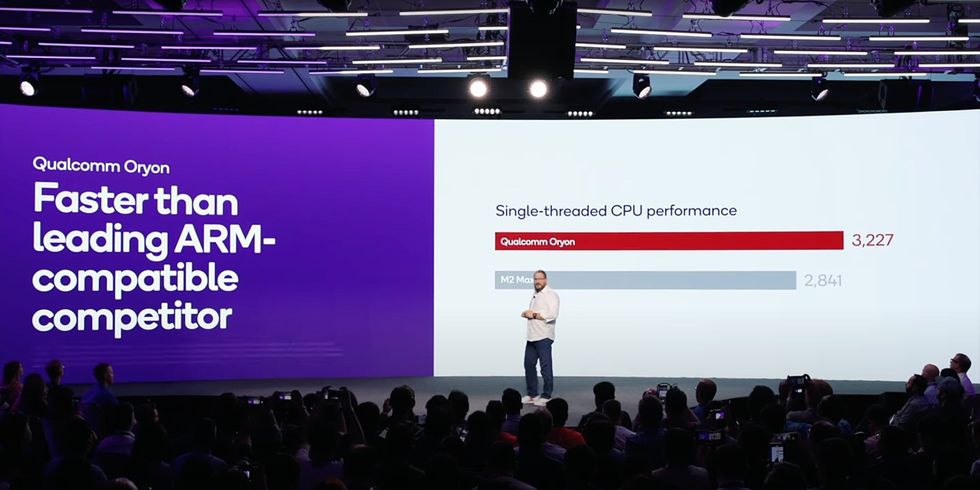Qualcomm is again coming for laptops—and this time, it means business.
At the company’s October 2023 Snapdragon Summit, Qualcomm announced the Snapdragon X Elite, a system-on-a-chip (SoC) with a custom Arm architecture designed specifically for laptop PCs. The new chip is far from Qualcomm’s first attempt to upset the PC’s status quo (the first Snapdragon laptops hit stores in 2017), but experts agree: This time, it’s different.
“I think the consensus is that [Qualcomm senior vice president of engineering] Gerard Williams and team have designed a compelling chip at the core level, definitely, and are at parity, if not outperforming, the competitive offerings out there, including those by Apple,” says Leonard Lee, executive analyst and founder of neXt Curve.
All performance, all the time
Williams is a key player in this story. Formerly Apple’s chief architect, he led the design of Apple’s in-house silicon for the iPhone, iPad, and Mac. His 2019 departure to form a startup, Nuvia, provoked a lawsuit from Apple. Qualcomm then acquired Nuvia in 2021, which seemingly set the stage for a legal showdown. But Apple dropped its lawsuit without comment in April 2023.
The Snapdragon X Elite announcement feels like a victory lap for Williams and his team. The new system-on-a-chip design is centered on a custom Arm CPU core, code-named Oryon, that will go toe-to-toe with Apple silicon, as well as x86 processors from Intel and AMD. And it does so with a pitch similar to the other options: great performance with very low power consumption.

The Snapdragon X Elite packs 12 Oryon cores that reach an “all-core” clock speed of 3.8 gigahertz, which can increase to 4.3 GHz when only two of the 12 cores are heavily taxed. The SoC’s thermal design power, which provides an indication of power consumption, is configurable to meet a particular laptop’s needs, but Qualcomm offered two example laptops, one with a total device power of 80 watts and another at 23 W. These numbers are in the ballpark of Apple’s MacBook laptops, including new models with the recently announced Apple M3 chip.
But there’s one aspect of Qualcomm’s architecture that veers off the Apple silicon script. The Oryon architecture doesn’t use larger “performance cores” alongside more compact “efficiency cores” in the manner of Apple silicon and recent Intel Core processors. Instead, Oryon puts the pedal to the metal and sticks with high-performance cores.
It’s an important difference. Efficiency cores can help an SoC hit extremely lower power consumption while idle and during less demanding tasks. Apple silicon can reduce idle power draw to as little as 200 milliwatts. However, the use of efficiency cores devotes space on the silicon to cores that aren’t as helpful in demanding tasks. Qualcomm—guided by Williams’s expertise—is making a bet it can deliver the best of both in a single core and, in turn, deliver better performance when it counts.
Does Qualcomm really stand a chance?
Past Snapdragon chips for laptop PCs have failed, often abysmally, to deliver performance on par with AMD Apple, or Intel. But early Oryon benchmarks show the architecture has struck gold.
Qualcomm showed its confidence with a hands-on session that let journalists put Snapdragon X Elite to the test. PC World’s Mark Hachman found the Snapdragon X Elite was up to twice as quick as Intel’s Core i7-1360P in Cinebench 2024, a popular multithreaded CPU benchmark.
Benchmarks show Qualcomm’s Snapdragon X Elite is competitive with Apple silicon and many Intel/AMD processors.Notebookcheck
Phil Solis, research director at the market research company IDC, saw the results for himself at the Snapdragon summit. “That was the most shocking part of the announcement, their comparison to [Intel Core] i7 and [Apple] M2 Max....They’re in the ballpark of competing with Intel and Apple, and that is a big deal.”
This has piqued laptop makers’ interest. The Snapdragon X Elite has a deep roster of partners that includes Acer, Asus, Dell, HP, Lenovo, Microsoft, Samsung, Xiaomi, and Honor. The first laptops with Snapdragon X Elite are likely to be revealed at CES 2024 in January.
“If you go and talk to Adobe, they already have a list of things you can’t do on x86 that you can do on an [Arm] AI PC.” —Leonard Lee, NeXt Curve
Qualcomm will also benefit from the emerging “AI PC” trend. The term, first promoted by Intel CEO Pat Gelsinger at the Intel Developer Conference in September 2023, broadly describes PCs that can handle generative AI on local hardware. Intel hopes its 14th-gen Core processors will become the go-to for AI on laptops, but Qualcomm is looking to outflank its x86 competition.
“I think Qualcomm can find synergies in the fact that software developers have discovered some of these cool AI-driven or AI-enabled functions within Apple’s [Arm chips]. And that will differentiate the software for the Arm stack from x86,” says Lee. “If you go and talk to Adobe, they already have a list of things you can’t do on x86 that you can do on an [Arm] AI PC.”
Apple and Qualcomm remain competitors, of course. The Apple M3 chip was announced on 30 October 2023, just six days after Qualcomm announced the Snapdragon X Elite. Yet a battle between the two tech giants could be beneficial for both. It suggests Apple’s success transitioning the MacBook from x86 to Arm was not a fluke—and that Qualcomm is the first in a flood of Arm alternatives to come.
“You have what Apple is doing. You have what Qualcomm is doing. And MediaTek also has Arm-based Chromebooks,” says Solis. “I really expect they’ll expand into PCs. Why wouldn’t they?”
Matthew S. Smith is a freelance consumer technology journalist with 17 years of experience and the former Lead Reviews Editor at Digital Trends. An IEEE Spectrum Contributing Editor, he covers consumer tech with a focus on display innovations, artificial intelligence, and augmented reality. A vintage computing enthusiast, Matthew covers retro computers and computer games on his YouTube channel, Computer Gaming Yesterday.



